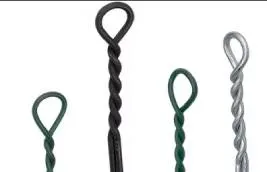-
 Phone:
Phone: -
 Email:
Email:

gauge of coat hanger wire
Understanding the Gauge of Coat Hanger Wire
Coat hangers are a ubiquitous household item, essential for keeping our clothes organized and wrinkle-free. However, many people may not realize that the thickness or gauge of the wire used in coat hangers significantly impacts their performance and durability. This article delves into the concept of wire gauge, particularly in relation to coat hanger wire, explaining its importance and the factors that influence hanger quality.
What Is Wire Gauge?
Wire gauge is a measurement that indicates the diameter of the wire used to create various products, including coat hangers. The gauge number follows a specific scale; lower numbers indicate thicker wire, while higher numbers indicate thinner wire. The most commonly used gauges for coat hanger wire range from 12 to 16. For instance, a 12-gauge wire is thicker and more robust than a 16-gauge wire.
The Importance of Wire Gauge in Coat Hangers
The gauge of coat hanger wire plays a critical role in determining the strength, flexibility, and overall usability of the hanger. Thicker wire (like 12-gauge) tends to offer greater strength and can support heavier garments, such as winter coats and suits, without bending or deforming. This makes it an ideal choice for professional wardrobes or seasonal clothing. Thinner wires, on the other hand, can suffice for lighter garments and may be more suited for delicate fabrics that do not require as much support.
Moreover, the wire gauge impacts the hanger's design. Thicker hangers may be bulkier, making them less suitable for tight storage spaces. Conversely, thinner hangers are more space-efficient but may not provide the same level of support for heavy items. Therefore, understanding wire gauge is essential for selecting the right hanger for your wardrobe needs.
Factors Influencing Hanger Quality
gauge of coat hanger wire

Several factors contribute to the quality of coat hangers beyond just wire gauge. One primary consideration is the type of material used for the wire. Common materials include steel and plastic, with steel being preferred for its durability and strength. Steel wire is often coated with additional materials, such as vinyl or chrome, to enhance the hanger's finish and prevent rusting.
In addition to material choice, the manufacturing process also affects hanger quality. Higher-end coat hangers may be crafted using advanced techniques that ensure uniform thickness and strength throughout the wire, leading to greater durability. Many budget-friendly options may compromise on these factors, offering hangers that might quickly bend or break, especially under the strain of heavier clothing.
Practical Implications
When purchasing coat hangers, consider the types of clothing you plan to store. If your closet features a variety of items, from delicate blouses to heavy winter jackets, an assortment of different gauged hangers may be beneficial. For everyday use, a standard 14 to 16-gauge wire hanger should be sufficient for lighter clothing, while a 12-gauge hanger would cater to heavier items.
Additionally, think about the space and organization within your closet. If you have limited space, opting for thinner hangers can help maximize storage efficiency while still maintaining the integrity of your garments. However, make sure the lighter hangers are suitable for the weight of the clothes you hang.
Conclusion
Understanding the gauge of coat hanger wire is crucial for optimizing your wardrobe’s organization and care for your clothes. By considering factors such as wire thickness, material quality, and the proper application for your clothing types, you can choose the right hangers that contribute to the longevity of your garments. The right coat hanger not only aids in effective storage but also adds a touch of orderliness to your closet space, proving that sometimes, even the simplest items can have a significant impact on our daily lives.
-
Wire Mesh for Every Need: A Practical SolutionNewsJul.25,2025
-
Steel Fences: Durable, Secure, and Stylish OptionsNewsJul.25,2025
-
Roll Top Fencing: A Smart Solution for Safety and SecurityNewsJul.25,2025
-
Cattle Farm Fencing Solutions for Maximum SecurityNewsJul.25,2025
-
Affordable Iron Binding Wire SolutionsNewsJul.25,2025
-
Affordable Galvanized Wire SolutionsNewsJul.25,2025
-
Wire Hanger Recycling IdeasNewsJul.25,2025








